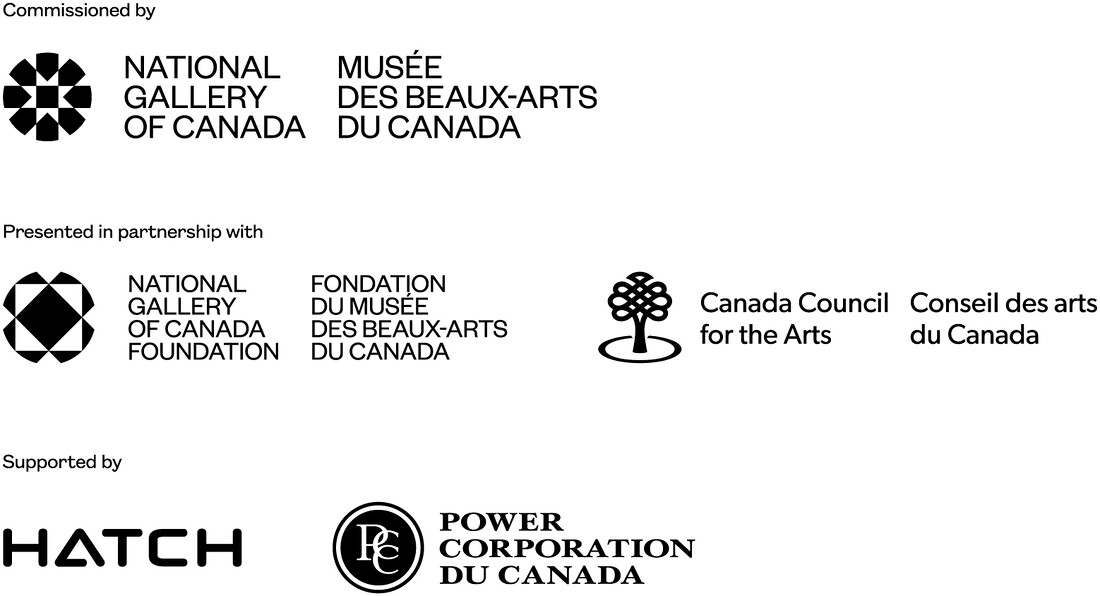Trinket
April 20–November 24, 2024
Giardini
Venice
Italy
The National Gallery of Canada (NGC), commissioner of Canada’s participation in the 60th Venice Biennale, unveiled this week the exhibition Kapwani Kiwanga: Trinket.
Kapwani Kiwanga has transformed the Canada Pavilion by way of a site-specific sculptural installation. She invites visitors into an immersive environment through an ambitious intervention on the building’s interior and exterior. Viewed from its facade, the building becomes a large-scale tableau: three-dimensional space collapses into a two-dimensional plane where distinctions between inside and outside dissolve through transparency, layering and transgressing of the building’s original boundaries. Kiwanga’s work is anything but static: as one moves through the coil-like architecture, it unfolds, multiplying the visitors’ perspectives.
The principal material employed in the installation consists of conterie, also known as seed beads. Conterie were dispersed from Murano in the Venetian archipelago and incorporated into various material cultures throughout the world. Historically employed as both currency and items of exchange, these tiny glass units are used by Kiwanga to deftly construct the monumental out of the minute. The same seed bead could be considered as an archive or a witness to past transactions that indelibly transformed the socioeconomic landscape of the 16th century and beyond.
Kiwanga is concerned with how diverse forms of power are manifested, how the histories they suppress are often overlooked, and the effect they have on everyday life. Her multidisciplinary works function as experiential archives that offer temporary ruptures in established conventions, allowing audiences to both experience and imagine alternative ways of relating and being. This installation addresses the often-destructive history of commerce, yet the work pushes further and asks one to consider how the trade of these beads for varied materials shaped the current world.
Other materials are integrated in nearly raw states within the exhibition space. Kiwanga selected these specific elements after researching transoceanic trade involving conterie. Rising from the floor onto the walls and spilling out into the courtyard, these materials emerge to encounter the beads. The meeting of these distinct materials with the beads formalizes a place of exchange, asking one to reflect on questions of inherent value, aesthetics, and the complexity of global economic relations.
Kapwani Kiwanga: Trinket is curated by Gaëtane Verna, Executive Director, Wexner Center for the Arts.
Kapwani Kiwanga: Trinket is commissioned by the National Gallery of Canada and presented in partnership with the Canada Council for the Arts and the National Gallery of Canada Foundation. The Canadian representation at the 2024 Venice Biennale is made possible through the Canadian Artists in Venice Endowment at the National Gallery of Canada Foundation and with the generous financial support of the Canada Council for the Arts, Hatch, Power Corporation of Canada, Wexner Center for the Arts and numerous private contributions.
Jean-François Bélisle, Director and CEO of the National Gallery of Canada, commissioner of the Canada Pavilion in Venice, has said: “We are honored to present Kapwani Kiwanga’s work at the 60th International Art Exhibition – La Biennale di Venezia. For nearly 130 years, the Biennale has endured—through countless transformations in our societies and in the museum world—as a vital forum where the world comes together and talks through art. It is through the Biennale that we recognize Canada’s place internationally, as perceived through the work of this country’s leading artists. Kiwanga is a relevant and provocative voice who places both a critical and aesthetic lens on manifestations of power now, as well as throughout time. Her project engages, in unprecedented ways, the direct site of the Pavilion as well as histories of the Biennale’s host city and beyond.”
Michelle Chawla, Director and CEO, Canada Council for the Arts, has said: “I am proud that the Canada Council for the Arts is supporting Kapwani Kiwanga’s immersive exhibition at the 60th International Art Exhibition – La Biennale di Venezia. In using beads to reference historical forms of trade and currency, the exhibition becomes a place for exchange and reflection on the complexity and challenges of global commerce and economics.”
Gaëtane Verna, Curator, has said: “Working alongside artist Kapwani Kiwanga in the context of the 2024 Venice Biennale is a chance of a lifetime. Kiwanga is a multidisciplinary artist whose methods, forms, and materials are ever-changing. Her practice is based upon extensive research on what might at first seem like a set of simple questions concerning histories, but they are deftly employed to examine how our societies have been built through social and cultural architecture, the imposition of laws, commerce, and other forms of exchange. For Kiwanga, materials are traces of human encounters that lead to the creation of new works, new forms that will intersect with the Canada Pavilion to create a complex installation where colour, light, sculpture, and architecture will engage visitors through a unique choreographed experience.”
Save the date: An international symposium on June 13–14, 2024 in Venice will convene scholars and researchers to delve into material culture, commerce and cultural transformation. The program will offer a comprehensive examination of the various lines of inquiry within Kiwanga’s ambitious project Trinket.
Press contacts
Within Canada: National Gallery of Canada, Josée-Britanie Mallet, bmallet [at] gallery.ca
International enquiries: Rosanna Hawkins, rosanna [at] reesandco.com



